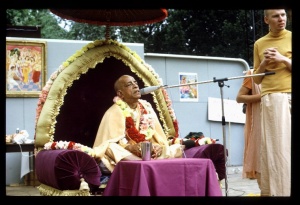CC Madhya 9.281: Difference between revisions
m (1 revision(s)) |
(Vanibot #0054 edit - transform synonyms into clickable links, which search similar occurrences) |
||
| (One intermediate revision by one other user not shown) | |||
| Line 1: | Line 1: | ||
{{ | [[Category:Sri Caitanya-caritamrta - Madhya-lila Chapter 09|C281]] | ||
<div style="float:left">'''[[Sri Caitanya-caritamrta|Śrī Caitanya-caritāmṛta]] - [[CC Madhya|Madhya-līlā]] - [[CC Madhya 9|Chapter 9: Lord Śrī Caitanya Mahāprabhu's Travels to the Holy Places]]'''</div> | |||
<div style="float:right">[[File:Go-previous.png|link=CC Madhya 9.280|Madhya-līlā 9.280]] '''[[CC Madhya 9.280|Madhya-līlā 9.280]] - [[CC Madhya 9.282|Madhya-līlā 9.282]]''' [[File:Go-next.png|link=CC Madhya 9.282|Madhya-līlā 9.282]]</div> | |||
{{CompareVersions|CC|Madhya 9.281|CC 1975|CC 1996}} | |||
{{RandomImage}} | |||
==== TEXT 281 ==== | ==== TEXT 281 ==== | ||
<div | <div class="verse"> | ||
kolāpure lakṣmī dekhi’ dekhena kṣīra-bhagavatī | :kolāpure lakṣmī dekhi’ dekhena kṣīra-bhagavatī | ||
lāṅga-gaṇeśa dekhi’ dekhena cora-pārvatī | :lāṅga-gaṇeśa dekhi’ dekhena cora-pārvatī | ||
</div> | </div> | ||
| Line 12: | Line 16: | ||
==== SYNONYMS ==== | ==== SYNONYMS ==== | ||
<div | <div class="synonyms"> | ||
''[//vanipedia.org/wiki/Special:VaniSearch?s=kolāpure&tab=syno_o&ds=1 kolāpure]'' — at Kolāpura; ''[//vanipedia.org/wiki/Special:VaniSearch?s=lakṣmī&tab=syno_o&ds=1 lakṣmī]'' — the goddess of fortune; ''[//vanipedia.org/wiki/Special:VaniSearch?s=dekhi’&tab=syno_o&ds=1 dekhi’]'' — seeing; ''[//vanipedia.org/wiki/Special:VaniSearch?s=dekhena&tab=syno_o&ds=1 dekhena]'' — He visited; ''[//vanipedia.org/wiki/Special:VaniSearch?s=kṣīra&tab=syno_o&ds=1 kṣīra]-[//vanipedia.org/wiki/Special:VaniSearch?s=bhagavatī&tab=syno_o&ds=1 bhagavatī]'' — the temple of Kṣīra-bhagavatī; ''[//vanipedia.org/wiki/Special:VaniSearch?s=lāṅga&tab=syno_o&ds=1 lāṅga]-[//vanipedia.org/wiki/Special:VaniSearch?s=gaṇeśa&tab=syno_o&ds=1 gaṇeśa]'' — the deity Lāṅga-gaṇeśa; ''[//vanipedia.org/wiki/Special:VaniSearch?s=dekhi’&tab=syno_o&ds=1 dekhi’]'' — seeing; ''[//vanipedia.org/wiki/Special:VaniSearch?s=dekhena&tab=syno_o&ds=1 dekhena]'' — He sees; ''[//vanipedia.org/wiki/Special:VaniSearch?s=cora&tab=syno_o&ds=1 cora]-[//vanipedia.org/wiki/Special:VaniSearch?s=pārvatī&tab=syno_o&ds=1 pārvatī]'' — the goddess Pārvatī, who is known as a thief. | |||
</div> | </div> | ||
| Line 19: | Line 23: | ||
==== TRANSLATION ==== | ==== TRANSLATION ==== | ||
<div | <div class="translation"> | ||
Śrī Caitanya Mahāprabhu then visited the town of Kolāpura, where He saw the goddess of fortune in the temple of Kṣīra-bhagavatī and saw Lāṅga-gaṇeśa in another temple, known as Cora-pārvatī. | Śrī Caitanya Mahāprabhu then visited the town of Kolāpura, where He saw the goddess of fortune in the temple of Kṣīra-bhagavatī and saw Lāṅga-gaṇeśa in another temple, known as Cora-pārvatī. | ||
</div> | </div> | ||
| Line 26: | Line 30: | ||
==== PURPORT ==== | ==== PURPORT ==== | ||
<div | <div class="purport"> | ||
Kolāpura is a town in the Maharashtra province, formerly known as Bombay Pradesh. Formerly Kolāpura was a native state, and it is bordered on the north by the district of Sāṅtārā, on the east and south by the district of Belagāma, and on the west by the district of Ratnagiri. In Kolāpura there is a river named Urṇā. From the Bombay Gazette it is understood that there were about 250 temples there, out of which six are very famous. These are (1) Ambābāi, or Mahālakṣmī Mandira, (2) Viṭhobā Mandira, (3) Ṭemblāi Mandira, (4) Mahākālī Mandira, (5) Phirāṅga-i, or Pratyaṅgirā Mandira, and (6) Yāllāmmā Mandira. | Kolāpura is a town in the Maharashtra province, formerly known as Bombay Pradesh. Formerly Kolāpura was a native state, and it is bordered on the north by the district of Sāṅtārā, on the east and south by the district of Belagāma, and on the west by the district of Ratnagiri. In Kolāpura there is a river named Urṇā. From the ''Bombay Gazette'' it is understood that there were about 250 temples there, out of which six are very famous. These are (1) Ambābāi, or Mahālakṣmī Mandira, (2) Viṭhobā Mandira, (3) Ṭemblāi Mandira, (4) Mahākālī Mandira, (5) Phirāṅga-i, or Pratyaṅgirā Mandira, and (6) Yāllāmmā Mandira. | ||
</div> | </div> | ||
__NOTOC__ | |||
<div style="float:right; clear:both;">[[File:Go-previous.png|link=CC Madhya 9.280|Madhya-līlā 9.280]] '''[[CC Madhya 9.280|Madhya-līlā 9.280]] - [[CC Madhya 9.282|Madhya-līlā 9.282]]''' [[File:Go-next.png|link=CC Madhya 9.282|Madhya-līlā 9.282]]</div> | |||
__NOTOC__ | |||
__NOEDITSECTION__ | |||
Latest revision as of 00:07, 20 February 2024

A.C. Bhaktivedanta Swami Prabhupada
TEXT 281
- kolāpure lakṣmī dekhi’ dekhena kṣīra-bhagavatī
- lāṅga-gaṇeśa dekhi’ dekhena cora-pārvatī
SYNONYMS
kolāpure — at Kolāpura; lakṣmī — the goddess of fortune; dekhi’ — seeing; dekhena — He visited; kṣīra-bhagavatī — the temple of Kṣīra-bhagavatī; lāṅga-gaṇeśa — the deity Lāṅga-gaṇeśa; dekhi’ — seeing; dekhena — He sees; cora-pārvatī — the goddess Pārvatī, who is known as a thief.
TRANSLATION
Śrī Caitanya Mahāprabhu then visited the town of Kolāpura, where He saw the goddess of fortune in the temple of Kṣīra-bhagavatī and saw Lāṅga-gaṇeśa in another temple, known as Cora-pārvatī.
PURPORT
Kolāpura is a town in the Maharashtra province, formerly known as Bombay Pradesh. Formerly Kolāpura was a native state, and it is bordered on the north by the district of Sāṅtārā, on the east and south by the district of Belagāma, and on the west by the district of Ratnagiri. In Kolāpura there is a river named Urṇā. From the Bombay Gazette it is understood that there were about 250 temples there, out of which six are very famous. These are (1) Ambābāi, or Mahālakṣmī Mandira, (2) Viṭhobā Mandira, (3) Ṭemblāi Mandira, (4) Mahākālī Mandira, (5) Phirāṅga-i, or Pratyaṅgirā Mandira, and (6) Yāllāmmā Mandira.